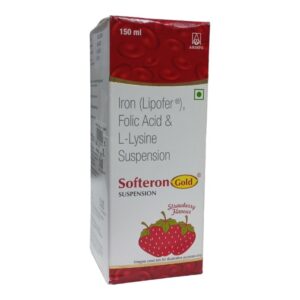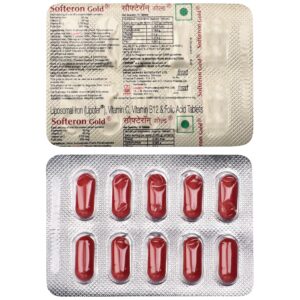FOLIC ACID + FERROUS FUMARATE + DOCUSATE SODIUM
Folic Acid: Folic acid is a synthetic form of vitamin B9, also known as folate. It is primarily used to prevent or treat folate deficiency and certain types of anemia caused by deficiency of this vitamin. Folic acid is an essential nutrient required for the production of red blood cells and DNA synthesis.
The mechanism of action of folic acid involves its conversion into active forms, such as folinic acid and tetrahydrofolic acid, which are necessary for various metabolic processes in the body. These active forms participate in the synthesis of DNA, RNA, and proteins, as well as in the formation of amino acids.
The recommended dose of folic acid varies depending on the indication. For preventing neural tube defects in pregnant women, the usual dose is 400-800 micrograms daily. For treating folate deficiency, the dose may be higher, ranging from 1 to 5 milligrams daily. It is important to follow the dosage instructions provided by a healthcare professional.
Folic acid is generally well-tolerated. However, some common side effects may include nausea, bloating, stomach cramps, and diarrhea. High doses of folic acid may mask the symptoms of vitamin B12 deficiency, which can lead to nerve damage if left untreated. It is important to consult a healthcare professional if any unusual or severe side effects occur.
Folic acid is available as an over-the-counter supplement and is also found in many multivitamin products. It is essential to consult a healthcare professional before starting any new medication or supplement, particularly if you have any underlying health conditions or are taking other medications that may interact with folic acid.
Ferrous Fumarate: Ferrous Fumarate is an oral iron supplement used to treat or prevent iron deficiency anemia. It is also prescribed to patients with chronic kidney disease who are on dialysis.
The mechanism of action involves the conversion of ferrous iron (Fe2+) in the drug to ferric iron (Fe3+), which can be readily absorbed by the body. Iron is an essential mineral necessary for the production of red blood cells and oxygen transport.
The recommended dose of ferrous fumarate varies depending on the individual’s age, gender, and the severity of the iron deficiency. Typically, for adults, the usual dose is 300 to 325mg, or as directed by a healthcare professional. It is usually taken once or twice a day with or without food.
Side effects of ferrous fumarate are generally mild and may include constipation, stomach upset, nausea, vomiting, diarrhea, or dark-colored stools. These symptoms can often be minimized by dividing the daily dose into smaller amounts or taking it with food. In rare instances, more severe side effects like allergic reactions, stomach pain, or black or tarry stools may occur. If any unusual or severe side effects are experienced, it is essential to seek medical attention immediately.
It is important to note that ferrous fumarate should be used under the guidance of a healthcare professional, as iron supplementation can have interactions with certain medications and medical conditions. Additionally, an overdose of iron can be toxic, especially in children, so it is crucial to keep this medication out of reach of children.
Docusate Sodium: Docusate Sodium, also known as Colace, is a medication used to treat or prevent constipation, as well as to soften the stool in certain conditions. It belongs to a class of drugs called stool softeners or emollient laxatives.
The primary mechanism of action of Docusate Sodium is to increase the amount of water and fat absorbed by the stool, making it softer and easier to pass. It works by surfactant activity, which reduces the surface tension of the stool, allowing water and fat to penetrate and soften it.
The recommended dose of Docusate Sodium varies depending on the individual and the severity of the constipation. It is generally taken orally as a capsule or liquid, usually with a full glass of water. Your healthcare provider will determine the appropriate dosage for you. It is important to follow their instructions and not exceed the recommended dose.
As with any medication, Docusate Sodium may cause side effects. Common side effects include stomach cramps, diarrhea, and mild nausea. Rare but serious side effects may include allergic reactions such as rash, itching, or swelling, as well as severe diarrhea or rectal bleeding. If you experience any severe side effects or have concerns, it is important to consult your doctor immediately.
It is worth noting that Docusate Sodium is not intended for long-term use. If constipation persists or worsens, it is advisable to consult a healthcare professional to identify and address the underlying cause.


